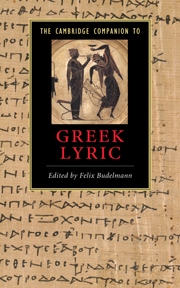Book contents
- Frontmatter
- Introducing Greek lyric
- Part I: Contexts and topics
- Part II: Poets and traditions
- 8 Iambos
- 9 Elegy: Forms, functions and communication
- 10 Alcman, Stesichorus and Ibycus
- 11 Alcaeus and Sappho
- 12 Anacreon and the Anacreontea
- 13 Simonides, Pindar and Bacchylides
- 14 Ancient Greek popular song
- 15 Timotheus the New Musician
- Part III: Reception
- Chronology of select melic, elegiac and iambic poets
- Further Reading
- Glossary
- List of works cited
- Index
8 - Iambos
from Part II: - Poets and traditions
Published online by Cambridge University Press: 28 May 2010
- Frontmatter
- Introducing Greek lyric
- Part I: Contexts and topics
- Part II: Poets and traditions
- 8 Iambos
- 9 Elegy: Forms, functions and communication
- 10 Alcman, Stesichorus and Ibycus
- 11 Alcaeus and Sappho
- 12 Anacreon and the Anacreontea
- 13 Simonides, Pindar and Bacchylides
- 14 Ancient Greek popular song
- 15 Timotheus the New Musician
- Part III: Reception
- Chronology of select melic, elegiac and iambic poets
- Further Reading
- Glossary
- List of works cited
- Index
Summary
Iambos has a long and rich history. As a literary form it emerges in the seventh century BCE, though as with all the lyric genres it must be heir to a long preliterate tradition. It flourishes for about a century, after which it attracts no major talents until it excites the imagination of Hellenistic poets. It then acquires a further lease of life in Rome through its influence on the works of Catullus and Horace.
We have no definition of iambos before the classical period and even then we are given not a definition but either passing references or indicative characteristics. Though iambos as a genre is resurrected in the Hellenistic period, its reemergence comes mediated through the prism of Hellenistic tastes and trends which inevitably involve refashioning and some degree of redefinition. We can however put together a plausible if tentative picture.
Though it is difficult when reconstructing iambos to escape the gravitational pull of the adjective 'iambic' with its connotations of metrical form, there is good reason to suppose that the term is not in origin metrical.
- Type
- Chapter
- Information
- The Cambridge Companion to Greek Lyric , pp. 149 - 167Publisher: Cambridge University PressPrint publication year: 2009
- 12
- Cited by

